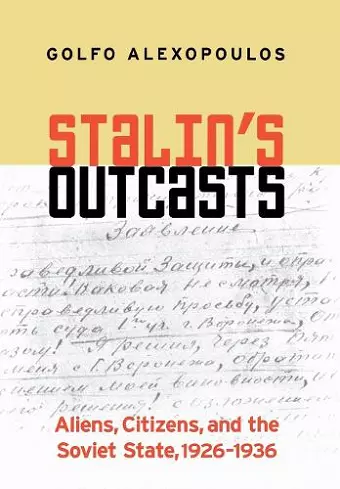Stalin's Outcasts
Aliens, Citizens, and the Soviet State, 1926–1936
Format:Hardback
Publisher:Cornell University Press
Published:14th Apr '03
Currently unavailable, and unfortunately no date known when it will be back

"I served not in defense of the bourgeois order, but only for a crumb of bread since I was burdened with five small children.""From 1923 to 1925 I worked as a musician but later my earnings weren't steady and I quickly stopped. Without an income to live on, I was drawn to the nonlaboring path.""As a man almost completely illiterate and therefore not prepared for any kind of work, I was forced to return to my craft as a barber.""I am as ignorant as a pipe."Golfo Alexopoulos focuses on the lishentsy ("outcasts") of the interwar USSR to reveal the defining features of alien and citizen identities under Stalin's rule. Although portrayed as "bourgeois elements," lishentsy actually included a wide variety of people, including prostitutes, gamblers, tax evaders, embezzlers, and ethnic minorities, in particular, Jews. The poor, the weak, and the elderly were frequent targets of disenfranchisement, singled out by officials looking to conserve scarce resources or satisfy their superiors with long lists of discovered enemies.Alexopoulos draws heavily on an untapped resource: an archive in western Siberia that contains over 100,000 individual petitions for reinstatement. Her analysis of these and many other documents concerning "class aliens" shows how Bolshevik leaders defined the body politic and how individuals experienced the Soviet state. Personal narratives with which individuals successfully appealed to officials for reinstatement allow an unusual view into the lives of "outcasts." From Kremlin leaders to marked aliens, many participated in identifying insiders and outsiders and challenging the terms of membership in Stalin's new society.
Alexopoulos explores the phenomenon of listhensy—those whom the Bolshevik regime categorized as 'exploiters' and the first Soviet constitution of 1918 formally disenfranchised.... This book suggests several important findings. Apart from details about the group's social profile (for example, gender, occupation, and ethnicity), it demonstrates the profound change in the meaning of this category from the mid-1920s—namely, from merely denoting exclusion from the electoral system to designation a group subject to pervasive discrimination and acute economic deprivation (which, for some, included deportation and hard labor).... It explores a new complex of sources and makes a significant contribution to our understanding of Soviet social history.
-- Gregory L. Freeze, Brandeis University * Slavonica *Alexopoulos made a systematic study of thousands of the 100,000 records available and came up with new information on the fate of Kulaks, who were perceived class enemies between 1926 and 1936. This is the first book to analyze the specifics of this aspect of Soviet history.
* Library Journal *At the core of this book is a painstakingly assembled database consisting of hundreds of individual petitions and case files that Alexopoulos uses to discuss the lishentsy as a loosely defined social category.... In many senses a methodological tour de force, Alexopoulos's database allows her to detail in sweeping empirical terms the trials and tribulations of thousands of forgotten casualties of socialist construction.... Stalin's Outcasts deserves to be widely read.
-- David Brandenberger, University of Richmond * Slavic Review *Offers new perspectives on the old problem of Russia's 'missing' middle class, by taking us far from the thematic and chronological limits conventionally imposed on our views of this social group. We get a new sense of the vigor and scale of the emerging 'commercial culture' and its celebration of a marketplace of values in Russia before 1917.
-- Dan Healey, University of Wales * Cultural and Social History *The past decade has been an exciting time for scholars of Soviet history. Following the collapse of the communist system, the Russian government declassified millions of official documents and thus provided researchers with a wealth of new information about the Soviet regime and its subjects. Many historians, myself included, have boasted about their access to newly opened archival materials, but few can match the claim of Golfo Alexopoulos, who not only gained access to declassified documents, but actually discovered an archive that few scholars even knew existed. On the remote edge of a small town in Siberia, behind a concrete wall topped with barbed wire, Alexopoulos located the Archive for the Preservation of Reserve Records, a state repository for over 100,000 case files on people deprived of rights under the Stalin regime. Based on these files, and on a range of materials from other archives, Alexopoulos has written a fascinating monograph on Stalinist definitions of citizenship and the suffering endured by those excluded from Soviet polity.... With this book, Alexopoulos makes a valuable contribution to the field of Soviet history. Its significance derives both from the importance of her topic and the originality of her research. The book deserves a wide audience among historians of Russia and will be read with interest by other scholars as well.
-- David L. Hoffman, Ohio State University * American Historical Review *We knew little about Soviet people who were constitutionally deprived of electoral rights. Golfo Alexopoulos is the first to tell their story, and she does it thanks to ingenious research in nine archives. Her book contributes not only to our understanding of early Soviet society. It should be required reading also for scholars interested in practices of social ostracism.
-- Gabor T. Rittersporn, Centre National de la Recherche Scientifique, Paris-Berlin * The Russian ReviISBN: 9780801440298
Dimensions: 229mm x 152mm x 25mm
Weight: 907g
256 pages